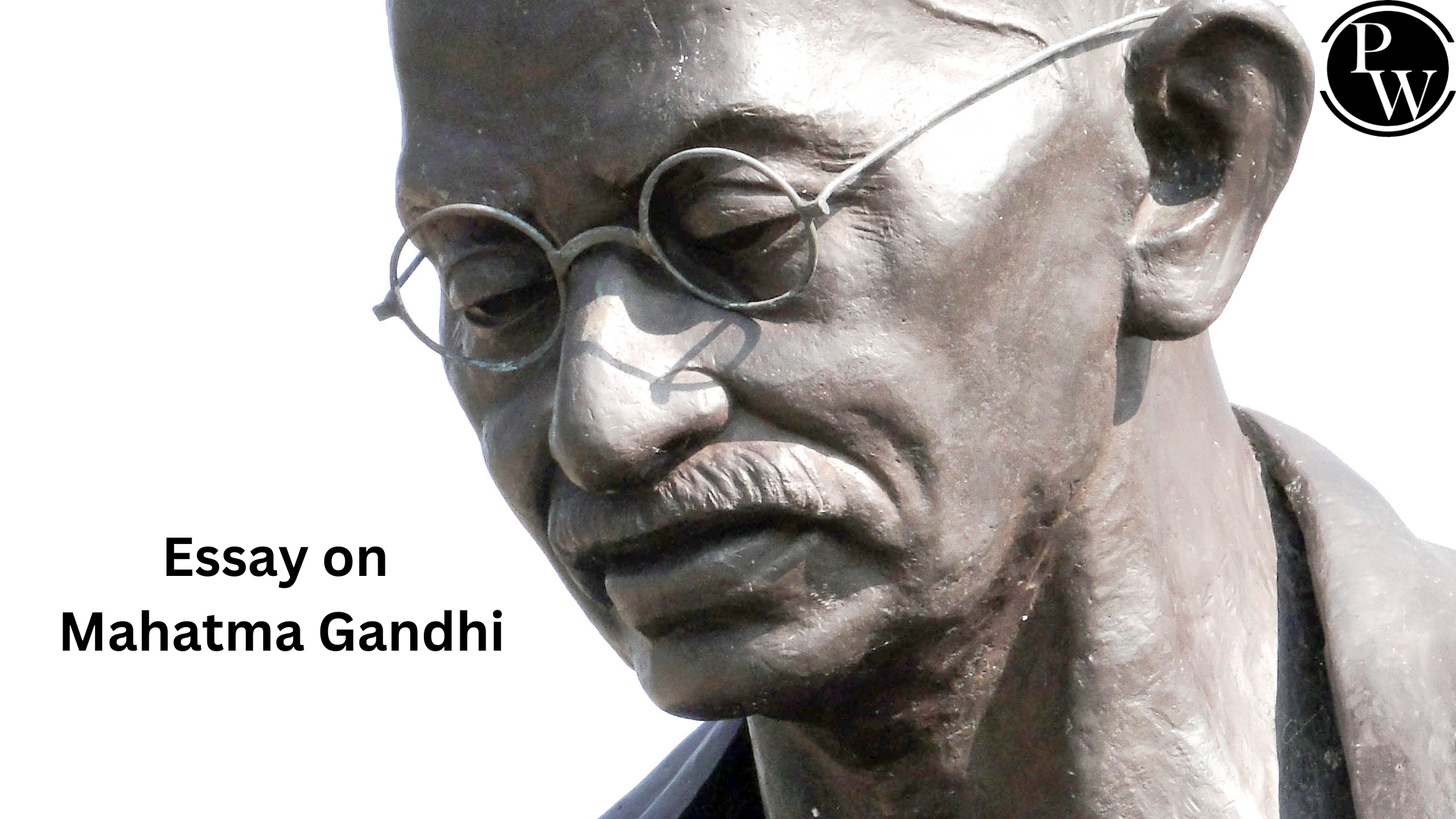

The essay on Mahatma Gandhi focuses on the life of Mohandas Karamchand Gandhi, also known as Father of Nation. Every year, on October 2nd, we observe Gandhi Jayanti to honour his efforts and beliefs. Schools and colleges mark this day by organising writing competitions and delivering patriotic speeches about Mahatma Gandhi. It is a national holiday, and all banks remain closed. This essay sheds light on his remarkable contributions and lasting legacy.
Essay on Mahatma Gandhi in English
Born on October 2, 1869, in Porbandar, India, Mahatma Gandhi led India's fight against British rule. His legacy centres on nonviolence, civil disobedience, and social justice, impacting the world and inspiring many movements globally. At 18, Gandhi journeyed to London to pursue law, initiating his exposure to Western thought and culture and sparking a profound interest in philosophy, ethics, and nonviolent resistance. His activism commenced in South Africa, where he spent over two decades combating racial discrimination and injustice. It was in this crucible that he first experimented with satyagraha, a nonviolent resistance rooted in truth and moral force. Gandhi's South African experiences profoundly influenced his philosophy, laying the groundwork for his pivotal role in India's quest for independence. His life and teachings continue to inspire individuals and movements worldwide. In 1915, Gandhi came back to India, swiftly rising as a key figure in the Indian National Congress. His philosophy, centred on nonviolence (ahimsa), became the cornerstone of the Indian independence movement. Gandhi believed that genuine independence could only be attained through nonviolent methods, highlighting the transformative force of love and compassion. A pivotal moment in Gandhi's civil disobedience was the Salt March of 1930. Protesting the British salt monopoly, he led a 240-mile march to the Arabian Sea. There, he and his followers definitely broke salt laws by gathering natural salt from the shores. This symbolic gesture rallied the masses and drew global attention to India's pursuit of freedom. Gandhi's dedication to nonviolence extended beyond politics to encompass all facets of life. He championed communal harmony, religious tolerance, and the empowerment of the oppressed. His teachings left a lasting impact on leaders who embraced nonviolent resistance in their quests for justice. Gandhi's life tragically ended on January 30, 1948, when a Hindu nationalist assassinated him. Despite his early demise, Gandhi's legacy persists. His nonviolence philosophy still influences global change, guiding individuals and movements morally. The United Nations marks October 2, Gandhi's birthday, as the International Day of Non-Violence, recognizing his lasting impact on peace and justice. Mahatma Gandhi, the advocate of nonviolent resistance, looms large in history. His life and teachings keep inspiring millions, emphasising the transformative strength of love, truth, and moral force. Reflecting on his legacy challenges us to embrace nonviolence principles in our lives and contribute to a more just and compassionate world.Essay on Mahatma Gandhi 200 words
Born on October 2, 1869, in Porbandar, India, Mahatma Gandhi is globally revered. His life and teachings left an enduring mark on human civilization. Gandhi, India's Father of the Nation, led the country to independence using non-violent civil disobedience, which he termed Satyagraha. Gandhi's early life emphasised morality and commitment to truth. His parents instilled simplicity, honesty, and service values. After law education in England, Gandhi worked as a lawyer in South Africa, where he witnessed Indian community discrimination, sparking his dedication to social justice. Gandhi's philosophy centred on non-violence or Ahimsa. He believed means must match the purity of goals. Violence, he argued, perpetuated hatred; instead, he endorsed passive resistance and civil disobedience for social and political change. His Satyagraha campaigns in South Africa and India showcased non-violent protest's effectiveness. During India's independence struggle, Gandhi's leadership was crucial. The 1930 Salt March protested the British salt monopoly, highlighting non-violent resistance's power. Gandhi's principles influenced global civil rights movements, inspiring leaders like Martin Luther King Jr. Gandhi envisioned a society based on truth, equality, and non-violence, extending beyond political freedom. Swaraj, or self-rule, included individual self-discipline, a decentralised economy, and uplifting the downtrodden. His commitment to communal harmony and religious tolerance aimed to bridge gaps between Hindus and Muslims. His assassination in 1948 marked a tragic end to a life dedicated to truth and harmony. Gandhi's impact transcends India's borders. His teachings on non-violence, truth, and social justice inspire global movements. The UN declared his birthday, October 2, as the International Day of Non-Violence. In conclusion, Gandhi's life exemplifies non-violence and moral strength's transformative power. Satyagraha, Ahimsa, and Swaraj remain beacons for those aspiring to a just and peaceful world. Gandhi's legacy urges us to pursue truth and justice, bringing change even amid challenges.Essay on Mahatma Gandhi 150 Words
Born in Porbandar, India, on October 2, 1869, Mahatma Gandhi played a crucial role in India's fight for independence and gained global recognition for promoting nonviolent resistance. Encountering racial discrimination in South Africa during his early years strengthened Gandhi's dedication to combating injustice through nonviolent means. Guided by his spiritual convictions, he advocated for the philosophy of "ahimsa," or nonviolence, viewing it as a potent catalyst for bringing about social and political transformations. Gandhi led iconic acts, like the Salt March in 1930 and adopting "Satyagraha" (insisting on truth) as a political strategy, crucial for India's independence.India got independence on August 15, 1947, fulfilling Gandhi's vision of a united, free nation. Gandhi's impact spans the globe, shaping civil rights icons like Martin Luther King Jr. and Nelson Mandela. His beliefs in truth, simplicity, and justice persist, fueling global efforts for peace, fairness, and human rights. In brief, Mahatma Gandhi's existence and lessons underscore the far-reaching power of nonviolence, forming an enduring heritage experienced worldwide, transcending cultures and time.Essay on Mahatma Gandhi 400 Words
Mahatma Gandhi, India's "Father of the Nation," was a significant leader in the country's fight for independence. Born on October 2, 1869, in Porbandar, Gujarat, he grew up in a devout Hindu family and became a key figure in India's history. Gandhi's philosophy of nonviolence, called "Satyagraha," played a crucial role in India's independence struggle against British rule. He developed this approach during his time in South Africa, facing racial discrimination and using nonviolent civil disobedience against injustice. Returning to India, Gandhi became a leader advocating for Indian rights, emphasising truth and nonviolence for social and political change. His unique leadership style involved living a simple life, reflected in his clothing – a loincloth and shawl, a contrast to the opulence of other leaders. Gandhi addressed social issues such as untouchability, poverty, and education, envisioning a harmonious society without discrimination. His campaign against untouchability aimed at abolishing this social evil, promoting equality. The Salt March in 1930 was a defining moment. In protest of British salt monopoly, Gandhi walked 240 miles to the Arabian Sea, producing salt illegally. This nonviolent act gained global attention, inspiring others to join the fight for independence. Gandhi's commitment to nonviolence was tested during the Jallianwala Bagh massacre in 1919. Despite British brutality, he urged peaceful protests, upholding his principles. His impact extended beyond politics, addressing social issues like untouchability, poverty, and education. He envisioned a society where all individuals could live together harmoniously, regardless of caste or creed. The Salt March in 1930 symbolised nonviolent resistance and civil disobedience against British salt monopoly. Gandhi and followers walked 240 miles, producing salt illegally, capturing global attention and inspiring others. Gandhi's commitment to nonviolence faced challenges, notably during the Jallianwala Bagh massacre in 1919. Despite British violence, he advocated peaceful protests. Gandhi's teachings continue to inspire civil rights movements worldwide. His emphasis on individual responsibility, self-discipline, and moral courage resonates across ages. Gandhi's legacy influenced leaders like Martin Luther King Jr. and Nelson Mandela, applying his principles in their struggles against injustice. In conclusion, Mahatma Gandhi's life and philosophy made a lasting impact. His commitment to truth, nonviolence, and social justice earned him global respect. Even at the elementary level, students can draw inspiration, learning about peaceful resistance, equality, and individual convictions. Gandhi's teachings remain relevant, guiding movements toward a just and compassionate world.Essay on Mahatma Gandhi for Class 4
Born on October 2, 1869, in Porbandar, India, Mahatma Gandhi is hailed as the Father of the Nation. His ideas shaped global movements for civil rights and freedom. This essay introduces Gandhi's life and legacy. Gandhi's early years were marked by simplicity. Raised in a devout Hindu family, he learned values like truth and non-violence early on. Despite being an average student, he showed an early interest in social issues. At 19, he went to London to study law, a decision influencing his leadership in India's fight for independence. Returning to India, Gandhi faced racial discrimination in South Africa, sparking his passion for justice and shaping his philosophy of nonviolent resistance. He believed in satyagraha, a passive resistance rooted in truth and nonviolence, realising its power for social and political change. Leading India against British rule, Gandhi united millions across caste, religion, and class. The iconic Salt March in 1930 symbolised self-reliance and showcased nonviolent resistance's strength. Gandhi's commitment to nonviolence was a lifestyle, emphasising simplicity, self-reliance, and truthfulness. His influence extended globally, inspiring figures like Martin Luther King Jr. and Nelson Mandela in their fights for civil rights and against apartheid. In conclusion, Gandhi's life and teachings remain relevant and inspirational. His dedication to truth and justice played a crucial role in India's independence and influenced the global fight against oppression. Introducing Gandhi's principles to the youth ensures his legacy lives on, fostering a world built on love, compassion, and justice. Mahatma Gandhi will be remembered as a guiding light in the quest for a better, more just world.Essay on Mahatma Gandhi for Class 5
Mahatma Gandhi, or Mohandas Karamchand Gandhi, led India to independence through nonviolent resistance. Born on October 2, 1869, in Porbandar, Gujarat, he embodied civil disobedience, earning the title "Mahatma" or great soul. Gandhi's childhood was simple, raised in a devout Hindu family with his father as Porbandar's prime minister. Despite privilege, he was a reserved child, educated in Porbandar and Rajkot, developing an interest in law. At 18, in 1888, he began his transformative journey by studying law in London. Returning to India in 1891, Gandhi practised law, but his focus shifted to social and political issues. Working as a lawyer in South Africa from 1893, he encountered racial discrimination, inspiring nonviolent protests and the philosophy of Satyagraha, emphasising truth's force. Gandhi's return to India in 1915 marked a pivotal moment in the independence struggle. Leading the Indian National Congress, he championed nonviolence and self-rule. His influence grew with movements like Non-Cooperation and Civil Disobedience, challenging British rule through peaceful means. The Salt March of 1930, a protest against the British salt tax, gained global attention, highlighting the power of nonviolent resistance. Gandhi's unwavering commitment to nonviolence influenced not only India's independence but also global civil rights movements, including Martin Luther King Jr.'s in the U.S. Gandhi faced challenges, yet he stood strong, convinced that love and compassion could conquer oppression. His death on January 30, 1948, marked the era's close, but his influence persists. Gandhi's lessons on nonviolence, truth, and justice still motivate positive change through peaceful methods. His life proves the lasting power of principles that surpass time and borders.Essay on Mahatma Gandhi for Class 6
Mahatma Gandhi, born on October 2, 1869, in Porbandar, India, was a pivotal figure in the Indian independence movement and a global advocate for nonviolent resistance. Gandhi's early experiences with racial discrimination in South Africa fueled his commitment to fighting injustice through nonviolence. Rooted in his spiritual beliefs, he championed the philosophy of "ahimsa," or nonviolence, as a powerful force for social and political change. Raised in a devout Hindu family with a political history, Gandhi studied law in London and faced discrimination in South Africa, shaping his commitment to social justice and non-violence. His philosophy, grounded in "Ahimsa" or non-violence, believed in love and compassion as tools for change. Satyagraha, meaning "truth force," guided his fight against injustice and colonial oppression. A pivotal moment was the 1930 Salt March, a 240-mile protest against British salt monopoly. This act of civil disobedience showcased the power of nonviolent protest, drawing global attention and advancing India's fight for independence. Gandhi, beyond a political leader, advocated communal harmony and religious tolerance. His commitment to non-violence extended to resolving Hindu-Muslim conflicts during heightened tensions. His teachings influenced leaders like Martin Luther King Jr., Nelson Mandela, and Cesar Chavez, shaping civil rights movements globally. Mahatma Gandhi's legacy transcends India's struggle for independence. His life and philosophy emphasise the transformative potential of non-violence, individual conscience, and moral courage in the pursuit of justice and freedom. Gandhi's principles remain relevant, inspiring generations worldwide toward a more just and compassionate world.Essay on Mahatma Gandhi FAQs
Who is Mahatma Gandhi in short?
Mahatma Gandhi, born Mohandas Karamchand Gandhi (1869-1948), was a key leader in India's struggle for independence against British rule. He was a prominent advocate for nonviolent civil disobedience and played a crucial role in shaping India's destiny.
Why is Gandhi called as Mahatma?
Gandhi is called "Mahatma," which means "Great Soul" in Sanskrit, as a term of respect and admiration. The title reflects his moral and spiritual leadership, as well as his commitment to nonviolence, truth, and the welfare of humanity.
What is the importance of Gandhiji?
Gandhiji is of immense importance due to his role in India's independence. His teachings on truth, nonviolence, and social justice continue to inspire movements worldwide. Gandhi's impact extends beyond political realms, influencing ideas of civil rights, freedom, and peaceful protest.
What is Mahatma Gandhi called?
Mahatma Gandhi is often referred to as the "Father of the Nation" in India for his pivotal role in the country's struggle for independence and his enduring influence on its values and principles.
Talk to a counsellorHave doubts? Our support team will be happy to assist you!

Check out these Related Articles
Free Learning Resources
PW Books
Notes (Class 10-12)
PW Study Materials
Notes (Class 6-9)
Ncert Solutions
Govt Exams
Class 6th to 12th Online Courses
Govt Job Exams Courses
UPSC Coaching
Defence Exam Coaching
Gate Exam Coaching
Other Exams
Know about Physics Wallah
Physics Wallah is an Indian edtech platform that provides accessible & comprehensive learning experiences to students from Class 6th to postgraduate level. We also provide extensive NCERT solutions, sample paper, NEET, JEE Mains, BITSAT previous year papers & more such resources to students. Physics Wallah also caters to over 3.5 million registered students and over 78 lakh+ Youtube subscribers with 4.8 rating on its app.
We Stand Out because
We provide students with intensive courses with India’s qualified & experienced faculties & mentors. PW strives to make the learning experience comprehensive and accessible for students of all sections of society. We believe in empowering every single student who couldn't dream of a good career in engineering and medical field earlier.
Our Key Focus Areas
Physics Wallah's main focus is to make the learning experience as economical as possible for all students. With our affordable courses like Lakshya, Udaan and Arjuna and many others, we have been able to provide a platform for lakhs of aspirants. From providing Chemistry, Maths, Physics formula to giving e-books of eminent authors like RD Sharma, RS Aggarwal and Lakhmir Singh, PW focuses on every single student's need for preparation.
What Makes Us Different
Physics Wallah strives to develop a comprehensive pedagogical structure for students, where they get a state-of-the-art learning experience with study material and resources. Apart from catering students preparing for JEE Mains and NEET, PW also provides study material for each state board like Uttar Pradesh, Bihar, and others
Copyright © 2025 Physicswallah Limited All rights reserved.











